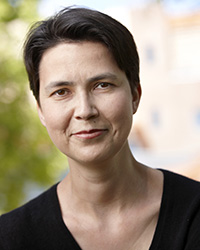Worldly Wisdom
Professor Marketa Trimble’s global impact on intellectual property law grows during pandemic

Professor Marketa Trimble, whose professional footprint reaches beyond the UNLV William S. Boyd School of Law and the United States, has only enhanced the international dimensions of her work amid the COVID-19 pandemic.
At UNLV Boyd Law since 2010, Trimble specializes in international and comparative intellectual property law. She has contributed to many international projects and collaborates with universities and research institutions in several countries.
Trimble has fostered relationships throughout the pandemic with two institutes of the Max Planck Society, which is Germany’s primary research institution. In addition to being a visiting professor at the Max Planck Institute for Comparative and International Private Law, she has served on the scientific advisory board of the Max Planck Institute for Innovation and Competition since December.
The board is at the forefront of research on many important aspects of intellectual property, including artificial intelligence and standard essential patents.
Earlier this year, Trimble helped draft the institute’s position statement on COVID-19 and the role of intellectual property. The statement was a response to multiple countries proposing that the World Trade Organization waive intellectual property rights to facilitate global access to COVID-19 vaccines.
“The statement notes the positive role that intellectual property rights play in incentivizing and facilitating complex vaccine development,” Trimble says. “It also lists a number of factors other than the existence of intellectual property rights that have been responsible for inequitable access to the vaccines.”
Amid the pandemic, Trimble also contributed to the work of an International Law Association committee that led to the adoption of the Kyoto Guidelines in December. The guidelines are designed to help attorneys, judges, and legislators navigate complex procedural issues in transnational intellectual property litigation.
Since the committee was truly international, Trimble says it had to reconcile a variety of diverse legal traditions, experiences, and expectations. It was also a challenge for the committee to go beyond a mere restatement of current principles to propose modern approaches to improve the transnational litigation of intellectual property cases.
“Of course, pushing the envelope too far could be problematic because courts and governments might be deterred from accepting and adopting the guidelines,” says Trimble, who has presented the guidelines at different events with her committee colleagues.
Beyond the impact she has had through her research on intellectual property law, Trimble—the Samuel S. Lionel Professor of Intellectual Property Law—continues to share her expertise with students at UNLV Boyd Law and abroad. In the past year, she has advised master’s and doctoral students from several countries, including in the LL.M. program in Intellectual Property organized by the University of Turin (Italy) and the World Intellectual Property Organization (Geneva).